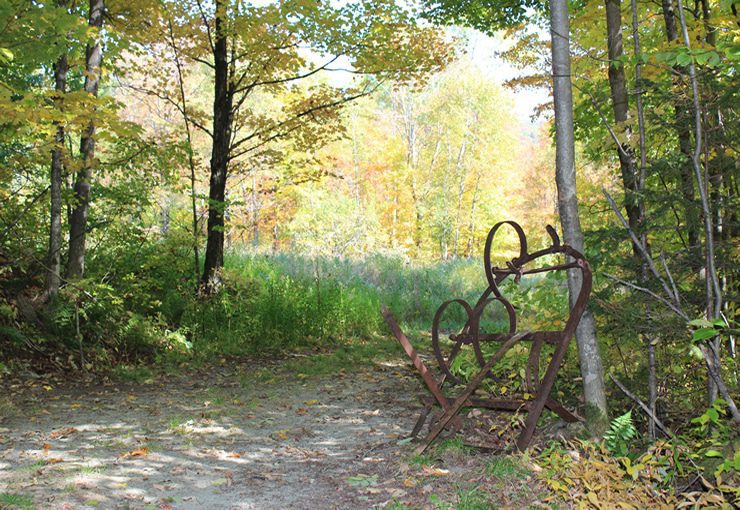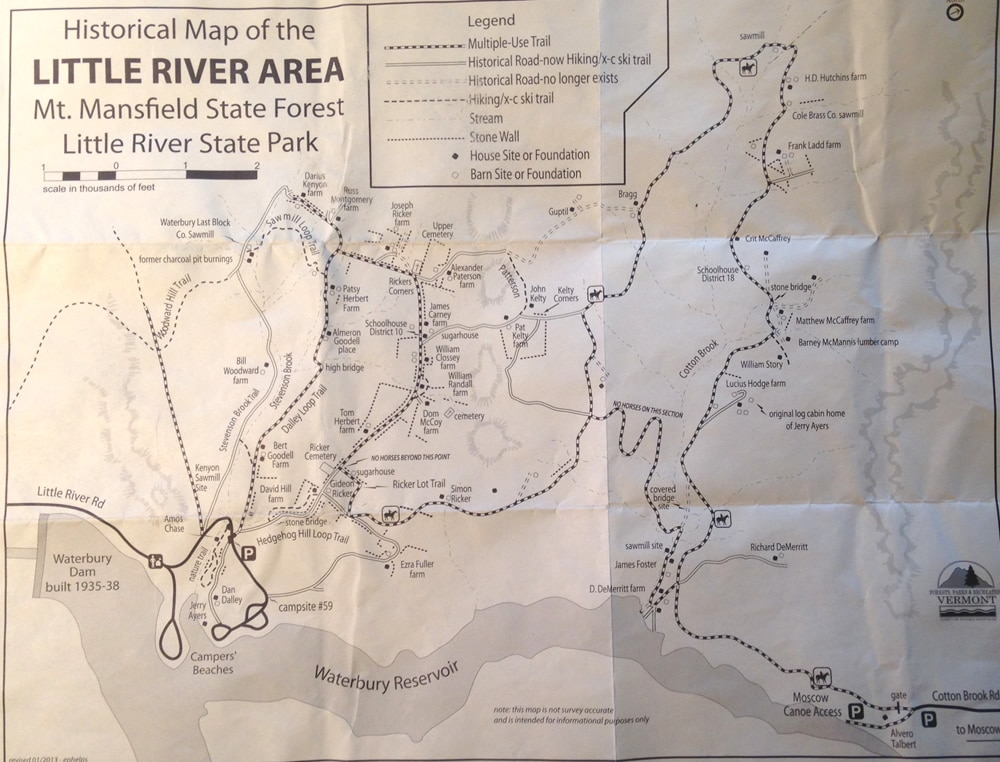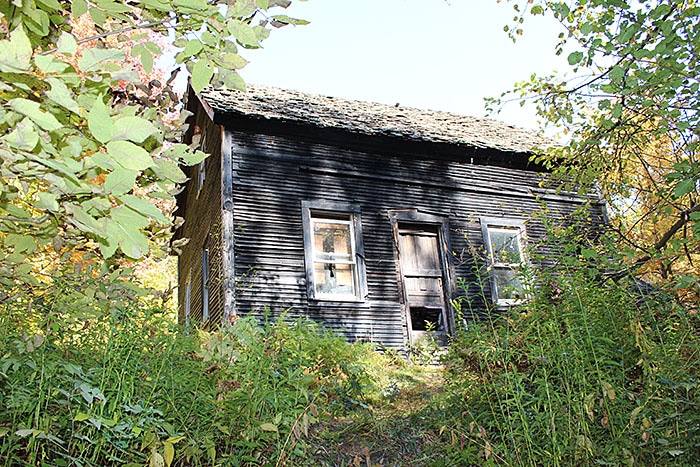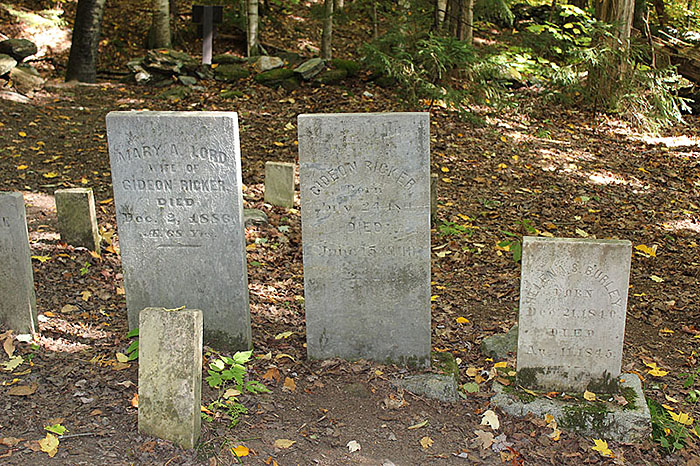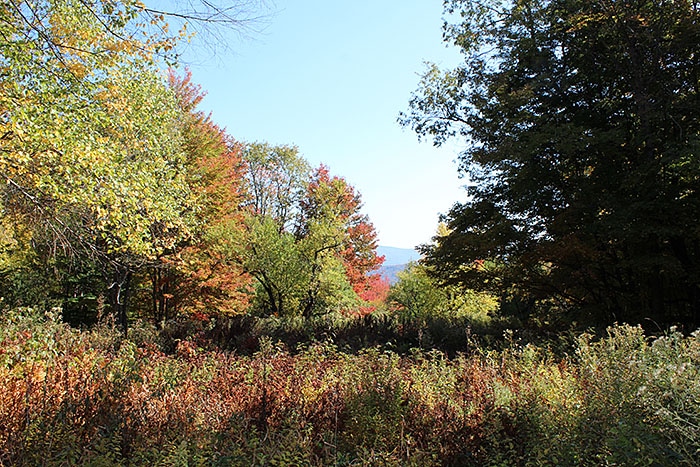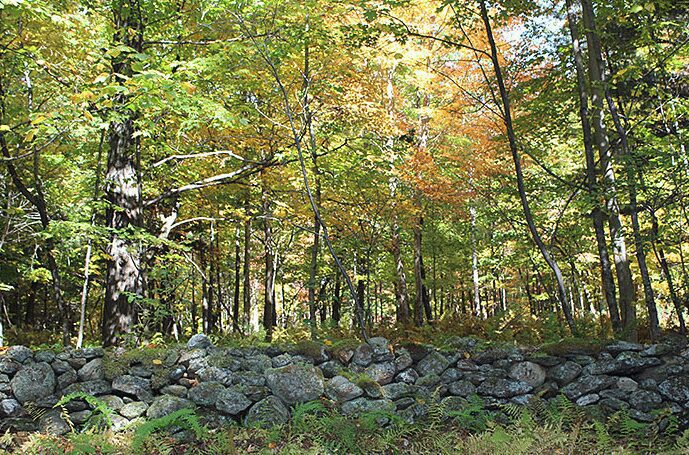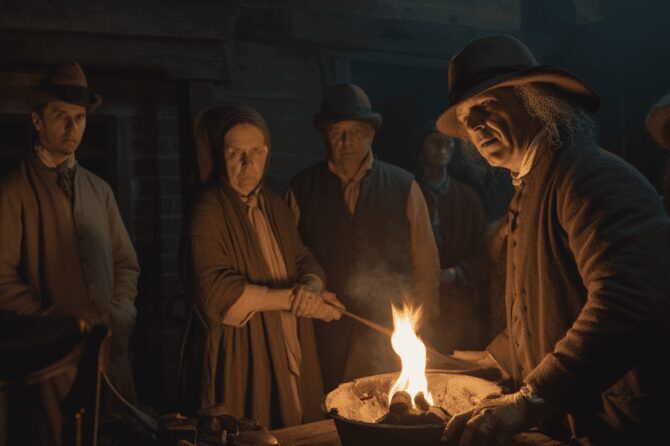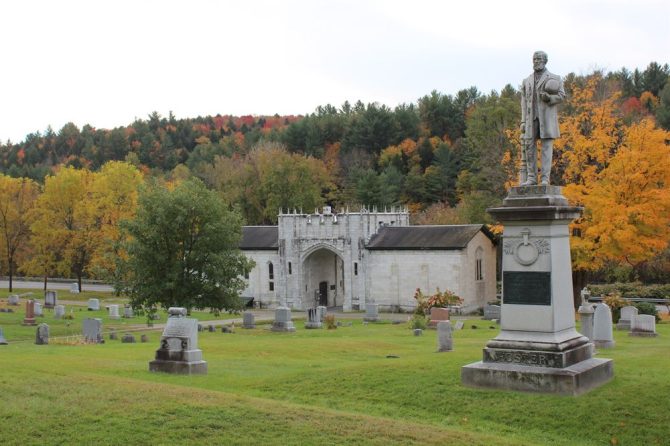Updated on 9/27/2023. A full photo gallery is also available to complement this Ricker Basin article.
Ricker Basin is an authentic “Vermont ghost town” and the perfect place for a hike. It is located at Little River State Park, which is a Vermont State Park located on Little River Road, just off River Road between Bolton and Waterbury.
Joseph Ricker established the community back in the 1800's on “Ricker Mountain”
Rocks and stumps were cleared out, and fields were created in Ricker Basin and Cotton Brook. Later, in the mid-1800s when the railroad made its way into Waterbury, the farming community began to take root in the area.
Although the timber industry's 3 sawmills were the driving force for the small community, trading and other creative uses of local resources also helped people to get by. However, life was never easy at Ricker Basin (or Ricker Mills), for the 50 or so families that lived there.
As the years passed into the late 1800s, families abandoned their homes and land. The steep landscape and issues with soil quality made life on Ricker Mountain difficult.
From 1916-1922, the Waterbury Last Block Co. sawmill provided gunstocks and ammo cases for WWI. The mill at one time had 35 men working and 44 teams of horses along with a truck. The steam-powered sawmill ended in 1922 after its short run. A flood in 1927, caused by unceasing rainfall and rising waters, sealed the fate of the area forever. By 1934, another flood drove out the few families who had remained in the community after the first flood. This was also the time that prompted the construction of the Waterbury Dam and Reservoir, which submerged much of what remained of the Ricker Basin community.
As of 2014, what remains of the community of Ricker Basin aka Ricker Mills is unfortunately, very little to nothing.
The one house still standing is the Almeron Goodell Farm. It is a creepy, dilapidated, and sad little house, open to the elements of nature and the carelessness of humankind. The roof is covered with moss and decay. The inside is covered with graffiti and ravaged by vandalism. The stench of age and bat guano fills the air with only peeks of sunlight peeking in through broken windows. Restoration seems very unlikely, and it will only be a matter of time before this homestead may rot to its stone foundations, like all of the other Ricker Basin farms in the abandoned community.
The Almeron Goodell Farm – View the complete Ricker Basin photo gallery here
All that remains of Ricker Basin, a Vermont abandoned ghost town
The Ricker Cemetery
According to an excellent Stowe Today article, you can also visit the Ricker cemetery and the grave of Florence Ricker, the last person buried there, in the dead of a bitter winter exactly 75 years after her birth.
Is Ricker Basin haunted?
Some claim that it is with some intriguing yarns that supposedly back up that claim. The following is courtesy of Chad Abramovich of ObscureVermont. Check out his article, which has many more photos and history to explore.
People often describe the abandoned, decaying structures—especially the Almeron Goodell farmhouse—as creepy and haunted-looking, fueling local lore.
Eerie silences, feelings of being watched, and unexplained noises lead many hikers and visitors to claim the area is haunted. However, most of these are rumors without detailed accounts.
A few years ago, John (an experienced hunter) took a hike into Ricker Mountain to experience the outdoors. He planned to spend some time hunting and camping. Woodsmen are experienced people who plan carefully. He found a spot for the campsite, cleared it of brush & branches, and even laid out flat stones for a fire pit.
The next night, he awoke to the sound of someone or something tugging at his tent straps. Again, the woods fell into that eerie silence. He sat up in his sleeping bag and tried to assess the bizarre situation, but couldn’t think about what to do other than wait for something to happen. The tugging soon stopped, and nothing ever happened. But he didn’t go back to sleep – and spent the rest of the night in anticipation, waiting until the sun rose. The next morning, he noticed the tent strap hadn’t just been pulled; it had been cut! It was a clean cut, as done with a knife, yet he hadn’t heard tearing fabric or the noises of any other human around.
On the third night of his camping trip, John thought he had heard his sleeping bag being pulled while he was half asleep. He panicked when he felt someone violently grabbing for it while still gripping the tent wall.
He instinctively grabbed his shotgun next to him and yelled, “Try that again and you’ll be sorry!” but nothing happened. He noticed the eerie stillness of the forest that surrounded him before sighing in relief. Nothing was making a sound, and this time, he recalled being incredibly uncomfortable by it. Surely he would have heard whatever the intruder was, retreating across all the brittle fallen leaves near the campsite, but he didn’t.
He knew it would be foolish to leave in the middle of the night, especially because he didn’t know what was out there waiting for him. It would make no sense to attempt to get back down towards the road. The night passed and he didn't sleep at all. He spent the time ready to fire his shotgun, and when dawn came, he began packing everything in preparation to leave.
As he took down his tent, he noticed something peculiar. As he ensured that the embers in the firepit were extinguished, he noticed something about one stone that formed the circular wall that he hadn’t seen before. Somehow, he used a fallen headstone from an old, forgotten cemetery. It was nearly indistinguishable from the dead leaves and branches scattered on the ground.
A beautiful place despite its forgotten past
The Horrifying McCaffrey Murder at Cotton Brook
According to Mable Harvey, of Waterbury, VT., the Cotton Brook area was also the scene of a grim murder. When the Civil War came to a close, Matthew McCaffrey, a veteran of the war, returned home to Greensboro, VT, and took a wife. They moved to the Cotton Brook area in Waterbury, where they all lived with his mother. The family comprised a son, daughter, twins, and possibly other children.
They all lived in a farmhouse on a road with a brook running by it, surrounded by an apple orchard. With acres of standing timber, it was an ideal place for McCaffrey to carry on work in lumber operations.
However, all was not well. McCaffrey rode horseback to Waterbury one day with a chain around the neck of his horse, claiming that the horse was going to kill his family. Naturally, the neighbors thought something was definitely amiss.
Madness leads to murder
Just a few nights later, McCaffrey thought he was hearing the cries of wild animals. He took a light into the bedroom and told his older children to look after the younger ones. He then took an ax and slaughter both his wife and mother. Wrapping the bodies in blankets, he carried them to the cellar. His 14-year-old son, either seeing or hearing the commotion, ran to the nearest neighbor for help. The bodies of the hapless victims were recovered by the authorities and buried in Greensboro.
Matthew McCaffrey was imprisoned, but after the trial, he was moved for treatment to the Brattleboro Retreat. He was eventually transferred to the Vermont State Hospital, where he remained confined for 29 years. Cotton Brook is a remote area where only the foundations of homes long gone remain. McCaffrey maintained an apple orchard, and the trees are still there, on the right as you hike uphill.
Another sad murder in the area…
A child's gravestone at the Duxbury Corner Cemetery reads: “Alice Meaker, April 18, 1880, aged nine years, eight months, nine days; Oh the agony and grief when the poisonous cup was given, and death came to her relief, and Alice sleeps in heaven.“
Alice Meaker lived with her grandmother at the top of Dillon Hill, across from the present town clerk's office in Waterbury. Someone named “Uncle Almon” also lived in the Meaker home. Not much was known of the mysterious “Uncle Almon” who came to live with the family. It was much later believed that the grandmother, fearing the child would communicate too easily with the “Uncle”, got rid of her.
What is known is that someone gave Alice poison. The person or persons then took her out of the house by night, carried her in a wagon to the Little River section, and buried her body underground, partially under a trough and by a wet, muddy swamp known as Mutton Hollow.
Alice came up missing, so local farmers and residents started a search. They came upon her body with evidence showing that she had not been dead when buried. Authorities arrested the grandmother along with “Uncle Almon”. A court convicted the grandmother of murder; she became the first and only woman ever hanged for murder in Vermont.
Mr. Meaker wept openly during the trial. Some people reportedly spat in the courtroom.
They dispatched Uncle Almon to State's Prison in Windsor, VT, for many years. Authorities later pardoned him, sending him home to resume his life.
The above information came from an article from the Roots Web Vermont Archive
An Autumn Hike to Ricker Basin
Hiking Ricker Basin (or Ricker Mills) in late September 2014 was quite an experience. Certainly not a ghostly or ominous one. The air was crisp and clean on an unusually warm autumn day. There were only 2 or 3 other hikers around, so it did feel odd to be so alone there, as I was enjoying a solo hike. The long incline of the Hedgehog Hill Trail was a bit of a challenge because of the incline. The terrain itself was excellent, but the long walk upwards wasn't nearly as easy as when I was 25 years old. I wish I had had the time and energy to explore the entire area, but a five-mile hike was enough for me by day's end.
At no time did I feel anything “haunted” or weird, even during a brief relaxation at the cemetery, where I pondered what life must have been like for these people back in those days. All of them are now long dead for nearly 100 years. If anything, a feeling of comfort and peacefulness permeated the air with only the sounds of birds, the wind, swaying trees, and crackling branches. It was lonely but in a good way that's hard to describe. I have to admit that I am very skeptical about the existence of ghosts. Were I to meet one, I'd probably have invited him or her to join me on my hike. I'd love to hear the stories of how these people lived and the hardships they endured.
Yeah, a ghostly tour guide would have been perfect. I just don't think I would have wanted to meet one coming up from the basement of the Almeron Goodsell farmhouse! That place was truly creepy for safety reasons, especially when you're hiking solo.
Also, here are a few great hiking videos courtesy of Old Wooden Trunk Adventures.
Ricker Basin photo gallery available here
For more information, read the Little River and Ricker Basin History
Finding the McCaffrey Murder House on Cotton Brook Rd, Waterbury Vermont
Hiking the Long Abandoned Ghost Town of Ricker Basin
Ricker Basin, near Waterbury, Vermont, offers an interesting array of reasons for individuals to consider embarking on a hiking excursion.
Foremost, the natural Vermont scenery at Ricker Basin is undeniably captivating. Expansive greenery that extends as far as the eye can see characterizes the landscape, interspersed with meandering streams winding their way through the woods. The aesthetic beauty of this pristine natural environment is nothing short of breathtaking and provides a serene and rejuvenating experience for those who venture there.
For enthusiasts of wildlife, Ricker Basin is a haven. Its diverse ecosystem is home to a wide variety of fauna, both large and small. Observant hikers may be fortunate enough to spot white-tailed deer grazing on the abundant foliage or agile squirrels darting among the trees. With patience, a bit of luck, and a keen eye, one may even have the privilege of witnessing the majestic flight of a bald eagle soaring gracefully overhead.
Beyond its natural allure, Ricker Basin holds historical significance as a part of the Green Mountain National Forest. This forest area has a rich heritage dating back to the era of Franklin D. Roosevelt's New Deal, and hiking through Ricker Basin offers an opportunity to connect with this historical legacy while appreciating the unspoiled natural surroundings.
The act of hiking in Ricker Basin provides excellent physical exercise. The terrain and trails offer a challenging and invigorating workout for the body. This outdoor adventure doubles as a natural fitness regimen, ensuring that hikers not only enjoy the scenic beauty but also reap the physical benefits of their journey.
In summary, the interesting reasons to consider hiking in Ricker Basin near Waterbury, Vermont, encompass its awe-inspiring natural beauty, the abundance of wildlife, its historical significance, and the opportunity for physical exercise. It stands as a remarkable destination for those seeking both serenity and adventure in the great outdoors.
Enjoy the fresh Vermont air and woodlands, contemplate the history and remaining artifacts from decades past, and leave Ricker Basin exactly as you found it—remove all trash. Enjoy your hike!
Thank you for visiting Vermonter.com! Please subscribe to our email list for the latest articles!

